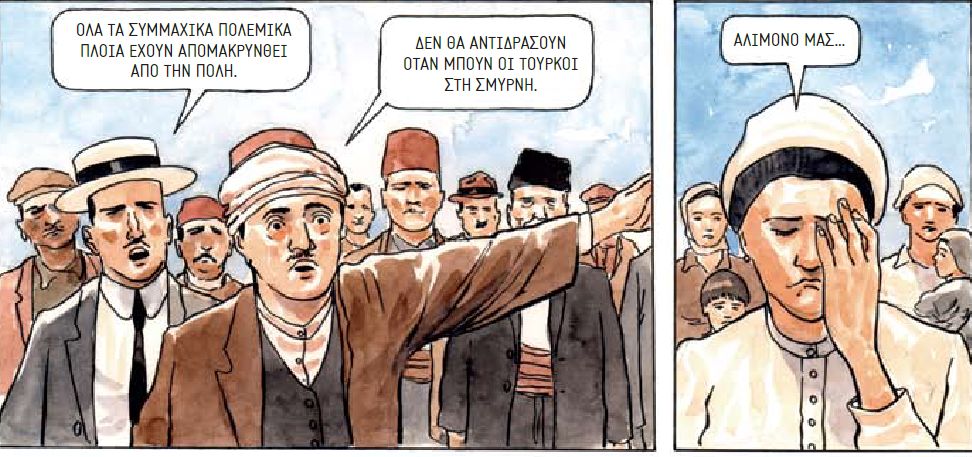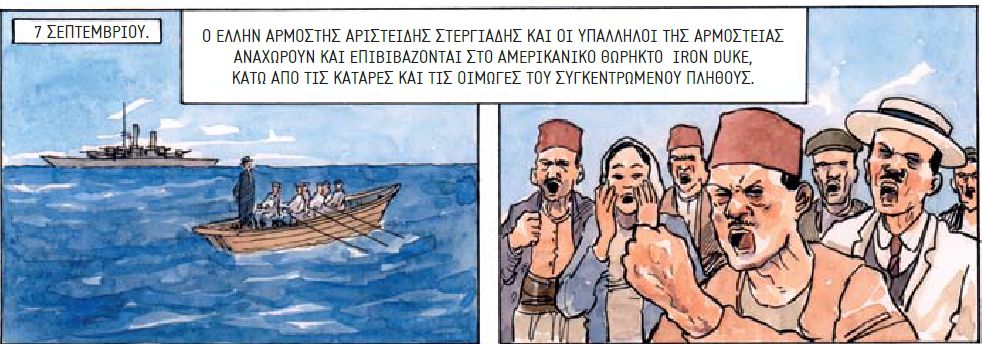By Ilias Karagiannis.
The images drawn by Thanasis Petrou have the ability to take you to another era. For a few minutes, as you browse Thanasis’ comics, you are gripped by a range of emotions.
Pain and extreme despair but also hope because, as he says in his interview with The Greek Herald, “there is always a note of optimism.”
Thanasis recently completed his comic trilogy focused on the national trauma of the Asia Minor Catastrophe.
In ‘1923: Hostile Homeland‘ (Icarus publications), Thanasis chronicles the extremely turbulent period of the Asia Minor Catastrophe, showing the immediate consequences of the loss of Smyrna and the collapse of the Asia Minor front on the society and economy of Greece.

This trilogy was preceded by ‘1922‘ (Icarus, 2021) and ‘The hostages of Görlitz‘ (Icarus 1920), which focused on World War I and National Division.
In the meantime, he also completed the comic ‘Lives Cut in Two,’ which became the occasion for several presentations-tributes in light of the 100th anniversary of the Asia Minor Catastrophe this year.
In his new comic ‘1923: Hostile Homeland,’ Thanasis is primarily interested in the social vilification of refugees. Exiled, impoverished, homeless and dramatically unpopulated, refugees experienced the heaviest decline of their lives in Piraeus.
And it’s wasn’t just about the unnecessary soldiers roaming the port, or the miserable spaces in which men, women and children were gathered, or the hatred that the locals harboured for the ‘outsiders.’
Our impression was that Thanasis had begun to deal with the Asia Minor Catastrophe long before the 100th anniversary this year.

“Basically my involvement with this trilogy began in 2019 and the reason was, as strange as it may sound, music,” Thanasis tells The Greek Herald.
“I wanted to make a comic book about rebetika but after doing my research I fell into the history of the Fourth Army Corps, which during World War I was transferred in its entirety in Germany, to Görlitz.
“The story was relatively unknown and exciting, so I changed my course. In Görlitz, however, there were around 200 recordings of spoken language and music organised by German scientists, linguists, etc. so music continued to be present in my comic book as a reference, but now my narrative focused on the historical events of the period of national division.
“The continuation with the story of the Asia Minor campaign that ended in the Asia Minor Catastrophe and the reception of refugees in Greece was, almost, a one-way street that I followed in my next two comics.”


Having dealt so thoroughly with one of the most important historical events of the last century for Greece, we ask Thanasis how he felt after reading the testimonies.
“This whole period, starting from the beginning of the 20th century with the Macedonian struggle, the Balkan Wars, The National Division, the First World War and ending in the Asia Minor Catastrophe of 1922, essentially shaped Greece, as it is today,” he says.
“Wars, political disputes, persecutions, uprooting, contributed to the end of irredentism and the Great Idea, but also constituted a new beginning, which led to a new, difficult, reality. Innocent people were tortured, distressed, unhappy, orphaned. It destroyed their lives.
“All this leaves you with a feeling of pain and bitterness, but at the same time shows that man retains hope for life, even under the most adverse conditions, so there is, fortunately, a note of optimism.”

The hostile attitude of the Greeks:
In his new work, ‘1923: Hostile Homeland’ Thanasis Petrou deals with the reception of the refugees of the Asia Minor Catastrophe in the motherland.
“It is certain that during the decade 1920-1930 thousands of refugees from Asia Minor ended up in distant Australia. I do not know what was the reception received by the locals in the fifth continent, but I hope, however, that it was better than that faced, in general, by the refugees from Asia Minor in Greece,” Thanasis says.
“The attitude of the local Greeks was from cautious to hostile towards refugees. They did not consider them brothers, compatriots, but interlopers who came to flood and occupy their place, to compete with them in the workplace, in the distribution of arable land. The locals therefore took a defensive attitude towards the refugees.

“Of course, gradually the refugees adapted as much as possible and showed that the cultural wealth they brought with them was priceless. They managed to live with the new Greek reality and eventually prospered.”
Thanasis consciously chooses in his first comics more pessimistic, dull colours while in the last, of the Hostile Homeland, more optimistic.
“Generally in my comics I try with colour to create a feeling and an atmosphere that fits in every time with the narrative. So, in the first two books, my palettes are more limited to create a connection with the place and space, for example the gray atmosphere of Germany or the desert and barren landscapes of the region beyond the Sangarius,” he explains.
“In the third book, my colour palette is adjusted to the new data. I would not say that it is directly related to a feeling of optimism, but I harmonise it, I think, in the topography and climate of bustling Piraeus.”


The political choices that led to the Catastrophe:
We ask Thanasis to tell us the view he formed from his study and research on what led to the Asia Minor Catastrophe.
“Everything was a matter of political choices. King Constantine wanted Greece to remain uninvolved in the First World War, Venizelos, hoping for future benefits for the country, wanted Greece to enter the war on the side of the Anglo-French,” Thanasis explains.
“The issue of the irredentist Christian populations of Asia Minor associated with the Great Idea is a narrative that runs through Hellenism, as early as decades, when, in 1919, Greece led by Venizelos is thrown into the Battle for the realisation of this idea.

“At the same time in the faltering Ottoman Empire there is a civil war between the Sultan and The Young Turks, Venizelos has on his side the Great Powers, and begins in 1919, the plan of landing a Greek army in Smyrna to protect the Christian populations of the region. Gradually, however, the climate will change, Venizelos will lose in the elections of 1920, King Constantine will return, Kemal will prevail in the Civil War, The Great Powers will gradually withdraw their aid to Greece with the well-known results – the defeat in the Asia Minor campaign and the Asia Minor Catastrophe.
“Therefore, in my opinion, all the protagonists of the period, political and military, had a share of responsibility. One cannot directly and exclusively blame one of them.”
Will the trilogy continue?
Thanasis answers: “In the third book my original idea was for my narrative to reach until 1936, when the dictatorship was imposed by Metaxas.”
“Unfortunately, the political-historical reality from September 1922 was so dense and intense that my narrative ends only in 1924 with the establishment of the First Republic in Greece,” he adds.
“So, yes, there will be continuity so that I can implement my original plan, which is to reach 1936.”

